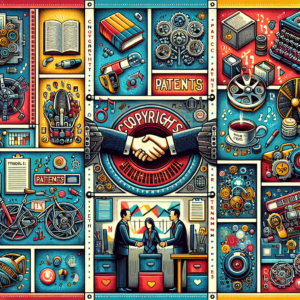Revolutionary New Copyright Laws: What You Need to Know Now!
[caption id="attachment_35119" align="alignnone" width="628"] Intellectual Property[/caption]
In a significant shift that could reshape the landscape of intellectual property, new copyright laws have been enacted, promising to address the complexities of the digital age. These revolutionary changes aim to balance the rights of creators with the needs of consumers and technology platforms. As stakeholders across various industries grapple with the implications, it is crucial to understand the nuances of these laws and how they may impact the creation, distribution, and consumption of creative works.
Understanding the Basics: An Overview of the New Copyright Laws
The newly implemented copyright laws introduce a comprehensive framework designed to modernize the existing legal structure governing intellectual property. These laws encompass a range of provisions that address the challenges posed by digital media, including streaming services, social media platforms, and user-generated content. Central to these reforms is the recognition of the evolving nature of creativity and technology, which necessitates a more flexible approach to copyright protection. The laws aim to enhance clarity regarding ownership, duration, and the rights of creators, while also considering the interests of consumers and the public domain.
Key Changes in Copyright Duration and Ownership Rights Explained
One of the most notable changes in the new copyright laws is the extension of copyright duration for certain types of works. While traditional copyright protection typically lasts for the life of the author plus 70 years, the new legislation introduces variations based on the type of work and its intended use. Additionally, the laws clarify ownership rights, particularly in collaborative projects and works created in employment settings. This includes provisions that ensure creators retain certain moral rights over their works, even when ownership is transferred. These changes aim to provide a more equitable framework for creators, ensuring they receive fair compensation and recognition for their contributions.
Implications for Creators: How the New Laws Affect Your Work
For creators, the new copyright laws present both opportunities and challenges. On one hand, the extended duration of copyright protection means that creators can benefit from their works for a longer period, potentially increasing their revenue streams. On the other hand, the complexities surrounding ownership rights may require creators to navigate new contractual agreements carefully. It is essential for artists, writers, and musicians to familiarize themselves with the specifics of the law to safeguard their interests. Furthermore, the laws encourage creators to explore innovative ways to monetize their works, such as licensing agreements and partnerships with digital platforms, thereby fostering a more dynamic creative economy.
Navigating Fair Use: What the Revisions Mean for Content Sharing
The concept of fair use remains a cornerstone of copyright law, but the new legislation introduces clarifications that could impact how content is shared and utilized. The revisions provide clearer guidelines on what constitutes fair use, particularly in the context of educational, transformative, and non-commercial uses. This is particularly relevant for educators, researchers, and content creators who rely on existing works to produce new content. However, the laws also emphasize the importance of context and purpose in determining fair use, which may lead to increased scrutiny and potential legal challenges. As such, individuals and organizations must remain vigilant in understanding the boundaries of fair use to avoid infringement.
Enforcement and Compliance: Responsibilities Under the New Legislation
With the introduction of the new copyright laws comes a heightened emphasis on enforcement and compliance. The legislation outlines specific responsibilities for both creators and platforms that host user-generated content. Digital platforms are now required to implement more robust mechanisms for monitoring and addressing copyright infringement, including the establishment of clear reporting procedures. Creators are also encouraged to take proactive steps in protecting their works, such as registering copyrights and utilizing digital rights management tools. The laws aim to create a more accountable environment where infringement is addressed promptly, thereby fostering respect for intellectual property rights.
Future Outlook: Potential Developments in Copyright Law and Policy
As the digital landscape continues to evolve, the new copyright laws are likely to undergo further refinements to address emerging challenges. Policymakers and stakeholders are already discussing potential developments, including the impact of artificial intelligence on creativity and copyright. The rise of AI-generated content raises questions about authorship and ownership, prompting calls for additional regulations to clarify these issues. Furthermore, ongoing debates about the balance between protecting creators and ensuring public access to information will shape future copyright policy. As these discussions unfold, it is essential for creators, consumers, and industry leaders to engage actively in the dialogue to influence the direction of copyright law.
In conclusion, the revolutionary new copyright laws represent a significant step forward in addressing the complexities of intellectual property in the digital age. By understanding the key changes and their implications, creators can better navigate this evolving landscape and protect their rights. As the legal framework continues to adapt to technological advancements, ongoing engagement and education will be vital for all stakeholders involved in the creative economy. The future of copyright law promises to be dynamic, and staying informed will be crucial for success in this ever-changing environment.
